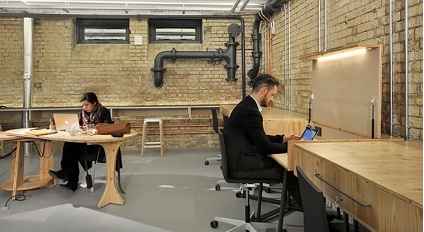The great thing about co-working is that one is surrounded by entrepreneurs and small start-ups. The atmosphere can be invigorating and the collaboration can lead to new and exciting concepts and companies. The downside is that those same great co-working environments can be isolating. Humans being humans, there is a tendency to fire up the laptop, put in the earphones and spend hours deeply connected — to a colleague in Delhi, or London, perhaps, but not to the person sitting right next to you.
A Netherlands-based co-working consultant, Jessica Tangelder, is out to change that with a ‘platform’ that encourages 20 minute interactive sessions among co-workers. The idea is that the person you may be sitting elbow-to-elbow with could be your next business partner, or that expert you’ve been looking for. But, unless you are forced out of your own space, you might never know it. A recent article in German news publication, DE, included an interview of Tangelder. According to Tengelder, the problem is clear. “What happens is, people are hiding behind their laptops,” Tangelder explained. “It’s not so much that they don’t want to share. It’s due to a threshold of overcoming their own boundaries of being vulnerable.”
Tangelder’s platform involves the designation of a facilitator, who works within an assigned co-working space to publicize each event and whose job it is to dislodge co-workers from their laptop bunkers into a common area where they can network. Each ‘session’ involves a different activity and is engineered to take no longer than 20 minutes.
Tangelder isn’t the only one promoting the break out session concept. Other spaces, such as Berlin’s Betahaus, offer free yoga sessions during the day to encourage interaction and relaxation. Maike Pulyer, the resident yoga instructor, finds that the yoga sessions force co-workers to get back inside their physical bodies and switch off their internet connected world. “People are ‘thinking’ themselves out of their bodies,” Pulver said. “They’re dealing with problems in India, and are Skyping with people in New Zealand, and can be all over just be all over the place, without really feeling the body.”
These scheduled sessions certainly seem good for the body and soul, but will they really help alleviate some of the sense of isolation experienced in co-working spaces? Or is it really more of a marketing concept designed to increase competitive advantage and provide exposure for third party services? Perhaps it is both.



 Dr. Gleb Tsipursky – The Office Whisperer
Dr. Gleb Tsipursky – The Office Whisperer Nirit Cohen – WorkFutures
Nirit Cohen – WorkFutures Angela Howard – Culture Expert
Angela Howard – Culture Expert Drew Jones – Design & Innovation
Drew Jones – Design & Innovation Jonathan Price – CRE & Flex Expert
Jonathan Price – CRE & Flex Expert











